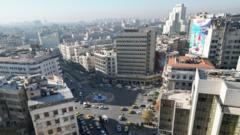In the wake of President Bashar al-Assad's ousting, top Arab diplomats from Jordan and Qatar have made significant visits to Syria aiming to foster renewed relations and support a transition towards stability in the region.
**Arab Diplomats Engage with Syria's New Leadership Following Regime Change**

**Arab Diplomats Engage with Syria's New Leadership Following Regime Change**
Arab nations move quickly to establish diplomatic ties with Syria post-al-Assad amid hopes for regional stability.
As the dust settles after two weeks since Bashar al-Assad's regime fell, the atmosphere in Syria is one of cautious optimism as Arab nations seize the opportunity to engage with the new leadership under Ahmed al-Shara. The visits by Ayman Safadi, Jordan's foreign minister, and Qatari Minister of State for Foreign Affairs, Mohammed Al-Khulaifi, signal a shift towards reconciliation after years of Syrian isolation.
For over a decade, Arab states largely severed ties with Assad due to his violent repression of the pro-democracy movement during the Arab Spring, which led to a devastating civil war. However, the recent change in leadership has inspired Arab diplomats to re-evaluate their approach. This shift is reflective of a broader strategy adopted by several countries, including Saudi Arabia, which had previously invited Assad to recent gatherings despite their earlier support of anti-regime factions.
Jordanian and Qatari officials have expressed their commitment to support a "peaceful transition process" in Syria, emphasizing the possibility for revitalized regional dynamics. The last decade saw a complicated landscape where combating Assad's regime transitioned into tactical engagement, illustrating the persistent complexities of Middle Eastern politics.
According to Julien Barnes-Dacey from the European Council on Foreign Relations, while the earlier efforts at engagement with Assad were met with failure, the newfound leadership presents an opportunity for realignment. Next steps on this diplomatic journey will likely hinge on the progress made in Syria under Ahmed al-Shara and whether the international community can support a stable governance structure moving forward.
For over a decade, Arab states largely severed ties with Assad due to his violent repression of the pro-democracy movement during the Arab Spring, which led to a devastating civil war. However, the recent change in leadership has inspired Arab diplomats to re-evaluate their approach. This shift is reflective of a broader strategy adopted by several countries, including Saudi Arabia, which had previously invited Assad to recent gatherings despite their earlier support of anti-regime factions.
Jordanian and Qatari officials have expressed their commitment to support a "peaceful transition process" in Syria, emphasizing the possibility for revitalized regional dynamics. The last decade saw a complicated landscape where combating Assad's regime transitioned into tactical engagement, illustrating the persistent complexities of Middle Eastern politics.
According to Julien Barnes-Dacey from the European Council on Foreign Relations, while the earlier efforts at engagement with Assad were met with failure, the newfound leadership presents an opportunity for realignment. Next steps on this diplomatic journey will likely hinge on the progress made in Syria under Ahmed al-Shara and whether the international community can support a stable governance structure moving forward.


















